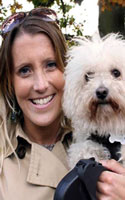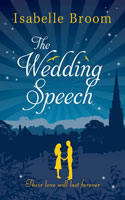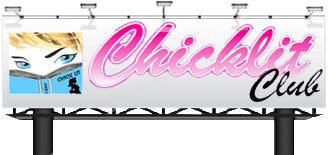INTERVIEW
August 2014

ISABELLE BROOM
Isabelle Broom’s The Wedding Speech won The Great British Write Off short story competition. She also works for heat magazine and is working on her first novel. (Interview by Jade Craddock)
Return to interview list
-

1. You’ve had quite a unique journey to publication, can you tell us a bit about how The Wedding Speech came to be published?
Unique is definitely true! Well, it all came about when I entered a competition called The Great British Write Off after spotting the link on Milly Johnson’s Twitter feed (she was one of the judges). Run by Simon & Schuster in association with Booksandthecity.com andHandbag.com, the comp required me to write a short story under the bracket of women’s fiction. I did, and it only went and won! To say I was honoured would be a huge understatement, and everything from then on has been a bit of a whirlwind. -
2. What was your immediate reaction when you found out you’d won the competition?
I got the email telling me I’d won while I was sitting at my desk here at heat magazine (I work as Deputy Production Editor and Book Reviews Editor), and I admit there was a fair amount of squealing, followed by a few words of disbelief that I won’t repeat here. Then I texted my boyfriend and rang my mum. It felt absolutely amazing! -
3. Have you always dreamed of being an author and do you think you would have tried your hand at writing a novel if it weren’t for the competition?
Yes, I most definitely have. When I was five, I used to fill exercise books with short stories accompanied by not-very-good drawings, and they all had titles such as “The Magic Rubber” and “The Clever Bear” etc. They all had happy endings, too. I carried on dabbling with writing all the way through my life, but it’s taken me until now to really be in a position to write a novel. I think you have to experience a certain amount of what life throws at you before you can really get to grips with human emotions and relationships. Winning the competition has definitely helped, though, because I feel like my self-confidence has been given a huge boost. -
4. Where did the inspiration for The Wedding Speech come from?
I wanted to find a way of including lots of characters into the limited word count, and I thought a wedding speech would be a good way of doing so, being as they are full of anecdotes and usually said in front of an audience. Also, a wedding speech is something most people can relate to. Plus, it gave me the opportunity to include both humour and pathos. A good speech is something people remember and talk about for years, so I wanted to do it justice.
-
5. Would you ever consider writing a full-length prequel or sequel to The Wedding Speech?
I’m totally in love with my lead character, Ed, so I’d love to take his story on past the end of the short, definitely. Perhaps fast-forward to a few years in the future, when he’s bringing up his own children and watching them grow up into adults. -
6. Part of your prize as well as getting your book published were sessions with a literary agent, a commissioning editor and bestselling author Milly Johnson, what was the most surprising thing you learnt about the publishing industry/being an author?
First of all, I have to say how totally invaluable those sessions have been. I can’t say that enough. All three have been amazing and so helpful. I would say the most surprising thing is finding out just how hard you have to sell yourself. With the industry as oversaturated as it currently is, it’s no longer enough to just write one good book – you have to think about yourself as a product and you must have enough ideas to keep you buoyant for years. I’ve never been very good at blowing my own trumpet, so I’ve had a bit of a wake-up call. The key thing to remember is that the publisher needs a reason to say yes, not reasons to say no.
-
7. What one piece of advice has stuck with you the most?
Be true to yourself. I review a lot of books for heat magazine, and it’s inevitable that other writing styles will creep in to your own work, but it’s vital that you don’t let yourself be too heavily influenced. When I allow myself to become fully absorbed in my own thoughts and just go with it, that’s when I produce my best work. In short: you have to learn to trust your own style and go with it. -
8. As a reviewer, you’ve reviewed hundreds of women’s fiction titles, do you think this has helped you develop your own writing?
Definitely! Mostly because it makes me strive to be better and push myself harder to come up with something that deserves to sit alongside these ladies. I would never want to be published on anything other than merit, and if I can’t meet the standard that’s out there already then I don’t deserve to be on the shelves. -
9. For you what makes great women’s fiction? And what’s your criteria for judging a book?
This will sound cliched, but it really all comes down to the characters for me. If I’m reading a love story, for example, then I have to believe in it – I have to feel the emotions flooding off the page. I like books that you can’t put down, stories that make you look at your own life differently and characters that you miss when you close the final page. It’s rare that a book can make me laugh and cry and want to yell about it from the rooftops, but those titles are the very best of all. -
10. There’ve been several high-profile women’s fiction authors who’ve made the leap from magazine journalism to bestselling author, why do you think this is?
Working in a magazine, especially one such as heat, is a hugely creative and sociable job. In the role of a journalist, you meet all sorts of people and find yourself in all manner of weird and wonderful scenarios, whether it’s on the red carpet with Leo DiCaprio standing right in front of you, inside the Big Brother house poking around in cupboards or clambering under the VIP ropes backstage at Earls Court and hiding behind a pot plant. All those experiences provide amazing fodder for a book, as do the conversations you’re having within the office every day. Writing as part of a job also just makes your writing better – it’s inevitable. None of us would do it unless we loved writing. -
11. Is it strange being on the other side as it were? What has been the most surreal thing?
Oh God, where to even start? I think the most surreal thing was when the book went up on Amazon. Being able to search for myself on that site and see myself come up…well, it felt miraculous and utterly mental! All the other writers of women’s fiction that I’ve met have been so lovely and supportive, too, but I still can’t get my head around being referred to as an “author”. My boyfriend introduced me to friends recently and dropped that word in, and I was mortified. Perhaps I’ll feel differently if and when (crosses fingers) my debut novel is published. -
12. How’s your first full-length novel going?
Well, I can’t say too much at this stage because it’s very much a work in progress, but I recently had a brainstorming and feedback session with two extremely brilliant and clever people, and that has resulted in the novel being a far larger but way more exciting beast. I’m massively excited about completing it and I think it could turn out to be quite special – hopefully! -
13. What do you hope to bring to the genre with your novel?
I’ve dug very deeply into my own emotions and experiences with this novel, so I hope to bring a lot of truth to the pages. I’ve always been fascinated by human relationships, so that’s an area I want to explore and really do justice to. I’m a big believer in having to love yourself and be content before you can share your life with someone else, and that’s a theme I won’t be straying too far from in the novel. I hope it will also bring a bit of a different twist, too, but to explain that in too much detail now would give too much away. -
14. Which is harder - writing a short story, writing a novel or writing reviews?
Oh wow, definitely a novel. A short story is like a tricky eggs’ benedict for two, whereby a novel is like preparing a banquet for 100 people! I edit as part of my daily job, so cutting down a short story is something I don’t struggle all that much with. And I adore writing reviews, because they just allow me to wax lyrical about all the reasons I loved a book. There’s nothing I enjoy doing more than talking about books. Well, except maybe writing them…! -
15. What are your writing goals?
My dream is to be a full-time writer, perhaps helping others with their creative process along the way, be it through teaching or mentoring. I picture myself in the mountains, with a view of the sea, writing by day, spending time with friends and family and just living life to the full. Cross your fingers for me everyone!
-
16. And finally, who is your writing icon?
This is a really tough question, because I have so many favourites. For a very long time, it was Jilly Cooper, because she makes me laugh my head off with her puns and her characters are nothing short of amazing. I love J.K. Rowling, too, because she created a whole other world and gave everyone who read her books a little bit of magic in their lives. She also happens to be one of the best writers of our generation. I have to also mention Lucy Robinson, whose recent book The Unfinished Symphony Of You And Me and quite simply the best thing I’ve read in yonks. She made me laugh and cry in the same sentence – and if I ever get published then it’s because I put her up on a pedestal and worked my darn hardest to clamber up after her.
